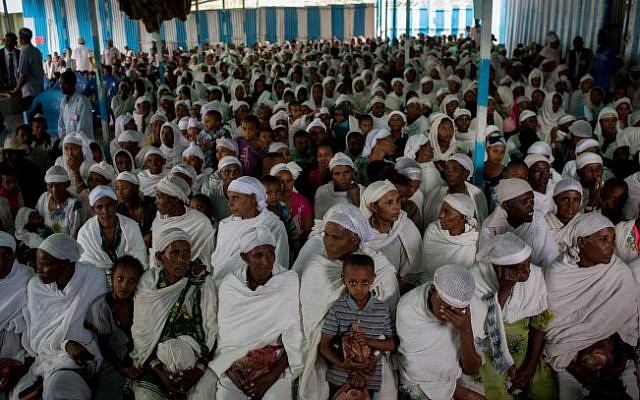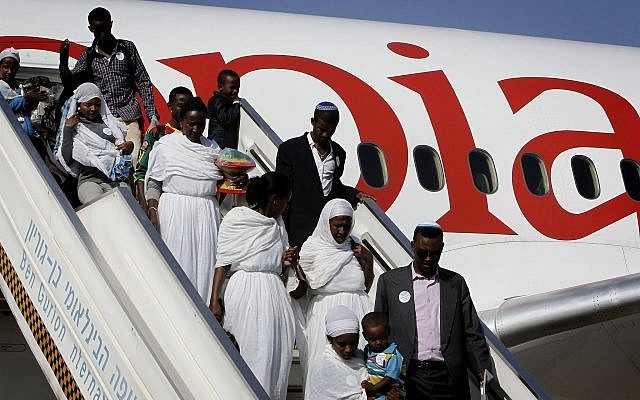timesofisrael || A plan approved last week to bring almost 400 Ethiopian immigrants to Israel is likely to get underway next week, Prime Minister Benjamin Netanyahu on Tuesday told a Likud campaign event focused on the Ethiopian Israeli community held in the central city of Rishon Lezion.
“I believe that the first plane will be on its way next week,” Netanyahu said of the measure, which will allow the new immigrants to reunite with family members already living in Israel.
Only 43 people will be brought next week, however, as they are the only ones who made the cut for immediate approval under immigration guidelines, according to Hebrew media reports.
The Health Ministry has controversially eased demands for medical checks and vaccinations that apply to immigrants from Ethiopia in order to expedite the process, and allow at least some of the new immigrants to arrive prior to the March 2 election, Channel 13 reported.
The cabinet approved the new immigrants despite opposition over the timing from Attorney General Avichai Mandelblit, who argued in a legal opinion that the move could be interpreted as a campaign ploy directed at Ethiopian Israelis just weeks before the March 2 election.

Likud is seeking to woo Ethiopian Jews ahead of the national vote. Many members of the community turned their backs on the ruling party in last year’s elections, following a series of high-profile incidents of police violence and amid ongoing concerns over government neglect and discrimination toward the community. Blue and White is also courting the Ethiopian vote. On Tuesday the party held a campaign event directed at the community in Rehovot.
Hours before the deadline to file party slates ahead of the March elections, Ethiopian Israeli MK Gadi Yevarkan left Blue and White for Likud, reportedly frustrated by his low placement on Gantz’s party list. Yevarkan had been placed 33rd on Blue and White’s electoral slate, putting him in danger of not entering the Knesset, but is No. 20 on Likud’s ticket.
The new immigrants approved by the cabinet would see members of the Falash Mura community from Addis Ababa and Gondar flown to the Jewish state.
The Falash Mura are Ethiopian Jews whose ancestors converted to Christianity, often under duress, generations ago. There are approximately 8,000 members of the community in Ethiopia with close relatives in Israel who are waiting to immigrate.
The planned immigration will include about 60 families that have been divided, with either parents or children already living in Israel, a key criterion for inclusion in the program, according to a Channel 12 report last month.

Funding for the plan is already available following an earlier government decision from 2018 to bring members of the Falash Mura to Israel which was not implemented, the report said.
While Ethiopian Jewish immigrants from the Beta Israel community are recognized as fully Jewish, immigrants from Ethiopia belonging to the smaller Falash Mura community are required to undergo Orthodox conversion after immigrating.
Because the Interior Ministry does not consider the Falash Mura to be Jewish, they cannot immigrate under the Law of Return, and therefore must get special permission from the government to move to Israel.
The plan has been dogged by budget shortfalls amid mutual recriminations from various ministries over which should fund the immigration drive. Blue and White chairman Benny Gantz has said he is “appalled to see how Netanyahu is carrying out a cynical election campaign on the backs of the Jews remaining in Ethiopia and their families here, whom he has neglected for a decade.”
The Ethiopian Israeli community says the process for immigration approval is flawed and poorly executed, dividing families. At least 80 percent of the Falash Mura members in Ethiopia say they have first-degree relatives living in Israel, and some have been waiting for 20 years to immigrate.
About 140,000 Ethiopian Jews live in Israel today, a small minority in a country of nearly 9 million.
Some 22,000 were airlifted to Israel during Operation Moses in 1984 and Operation Solomon in 1991. But their assimilation has not been smooth, with many arriving without a modern education and then falling into unemployment and poverty.
2019 saw widespread and sometimes violent protests by Ethiopians in Israel, after the police killing of an unarmed teen, the latest in series of incidents of racism and police brutality against Ethiopian-Israelis.

























